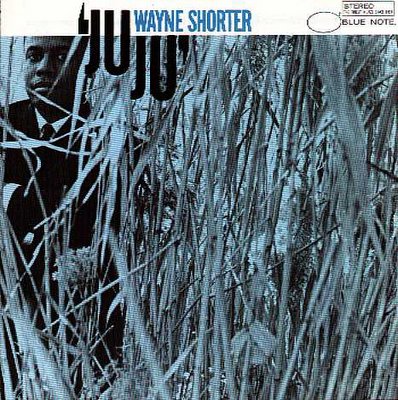 Black History Month continues at HurdAudio with a listen to Juju by Wayne Shorter circa 1964. This quartet is outstanding. Each name inspires profound awe for jazz aficionados: Wayne Shorter on tenor, McCoy Tyner on piano, Reginald Workman on bass and Elvin Jones on drums. Throw in the fact that this is a Blue Note record from one of their golden eras and you come up with a listening experience that is deeply satisfying every time.
Black History Month continues at HurdAudio with a listen to Juju by Wayne Shorter circa 1964. This quartet is outstanding. Each name inspires profound awe for jazz aficionados: Wayne Shorter on tenor, McCoy Tyner on piano, Reginald Workman on bass and Elvin Jones on drums. Throw in the fact that this is a Blue Note record from one of their golden eras and you come up with a listening experience that is deeply satisfying every time.Kicking off with the title track, "Juju" opens with a sound of pure joy as Tyner cascades his distinctive harmonies before Shorter comes in with an inspired melodic line. Then comes a great piano solo over the infectious 3/4 groove. Wayne Shorter answers with a solo of his own as he plumbs and develops the soundscape he composed for this session. Following this the ears are treated to an Elvin Jones drum solo. In my mind, one of the greatest to ever work behind the kit. The melodic statement returns and it's clear that this is one of the great Blue Note records of any era.
"Deluge" slows the tempo down for another side of Shorter's great melodic mind. Laid back and accompanied by these great parallel harmonies from McCoy Tyner.
Tyner sets the tone for "House of Jade" with a solo piano introduction that paints an inviting modal territory. Then Shorter enters with an easy going melodic line before soloing over some steady backup from this rhythm section. Shorter occupies the focal point through most of this one.
"Mahjong" starts off with Elvin Jones carefully crafting a reserved introduction on he drums. The piano and bass then roll out a harmonic floor just ahead of Shorter's entrance on this one. Shorter's use of dynamic range on this one is outstanding.
"Yes or No" hits an uptempo stride with the melody coming right away and keeps up a steady momentum throughout. Shorter effortlessly navigates some tricky chord changes and seems to effortlessly spin out linear lines that adhere closely to this harmonic soundscape. The piano solo is pure Tyner-esque joy.
"Twelve More Bars to Go" is a blues tune (as the title implies) that leaves plenty of room for these great performers to stretch out and respond to one another.
This particular release includes alternate takes of "Juju" and "House of Jade" at the end. Which pulls the ear back toward earlier moments in this listening experience and deepens one's understanding of these compositions with the variations in performance and solo materials. In many ways, I find this alternate take of "Juju" more interesting with regard to some of the broken-scalar material Shorter spins out in his solo as well as the aggressive energy in the short Elvin Jones solo toward the end. And "House of Jade" is a significant attraction compositionally so the alternate take is a welcome addition here.


No comments:
Post a Comment